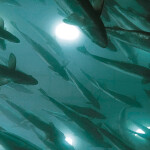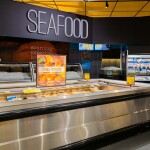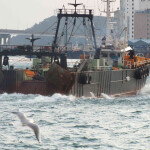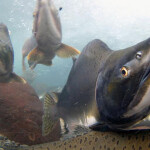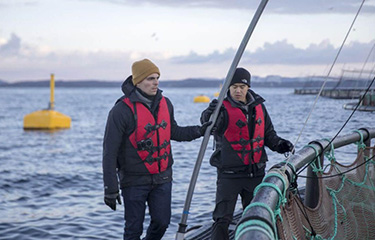A partnership between aquafeed manufacturer Veramaris and aquaculture data analytics firm Manolin has revealed new details in how feeds high in omega-3s impact commercial salmon farming output.
Through the partnership, Vermaris and Manolin used data collected from over 232 million fish and 99 farms to determine what benefits – if any – including higher levels of EPA and DHA omega-3s in feed might have. Through the study, the companies identified the optimal omega-3 levels in feed, Veramaris said.
Algae-based feed-maker Veramaris is a past winner of the Future of Fish Feed Challenge. It's algae-based oil has been shown through studies to either be able to replace fish oil in diets or improve the outcomes of multiple species such as California yellowtail and shrimp.
Manolin CEO Tony Chen said the collaboration between Manolin and Veramaris, is a partially a result of his company’s collection of data from its AI-supported platforms. Manolin recently released an AI-supported platform to optimize aquaculture performance and has introduced a number of other technological innovations to aquaculture including benchmarking tools and geospatial analysis, risk forecasting, and disease tracking.
“Our platform has collected data from more than 900 generations of farm salmon, producing insights for the aquaculture industry and demonstrating the immense potential of leveraging data intelligence in aquaculture research,” Chen said. “In addition, our anonymous and unbiased data is well-placed for industry collaborations such as this one with Veramaris.”
Chen said Veramaris needed a way to determine whether changing concentrations of omega-3s in feed had any impact on different generations of salmon. Using Manolin’s “Harpoon” platform, the two companies collaborated on an 11-week study analyzing data from 291 generations of farmed salmon.
Through the 11-week study, Manolin said it found “statistically significant” results in terms of both feed performance and overall harvest quality between feeds with varying levels of EPA and DHA omega-3s.
“Most notably, the results indicate that at EPA + DHA levels above 8 percent, farmers have seen a statistically significant improvement in the performance in the categories of superior quality and mortality percentage,” Manolin said in a release.
Veramaris said the results of the new study have provided a proof of concept for the company, allowing it to “unlock the full potential of Veramaris’ optimum omega nutrition approach.”
“The results, which used data from some 232 million fish, have deepened our understanding of the impact of EPA and DHA levels on the performance of farmed salmon,” Veramaris Global Business Development Manager Yann Le Gal said.
The results of the study went beyond what Veramaris expected and will help the company continue to tailor its aquaculture feed in the future, Gal said.
"With Manolin's expertise and robust data analysis, we are equipped with invaluable insights to further support fish health and welfare,” Gal said. “We look forward to further collaboration with Manolin as we continue to lead the way in science-driven solutions for the aquaculture industry."
Photo courtesy of Veramaris

